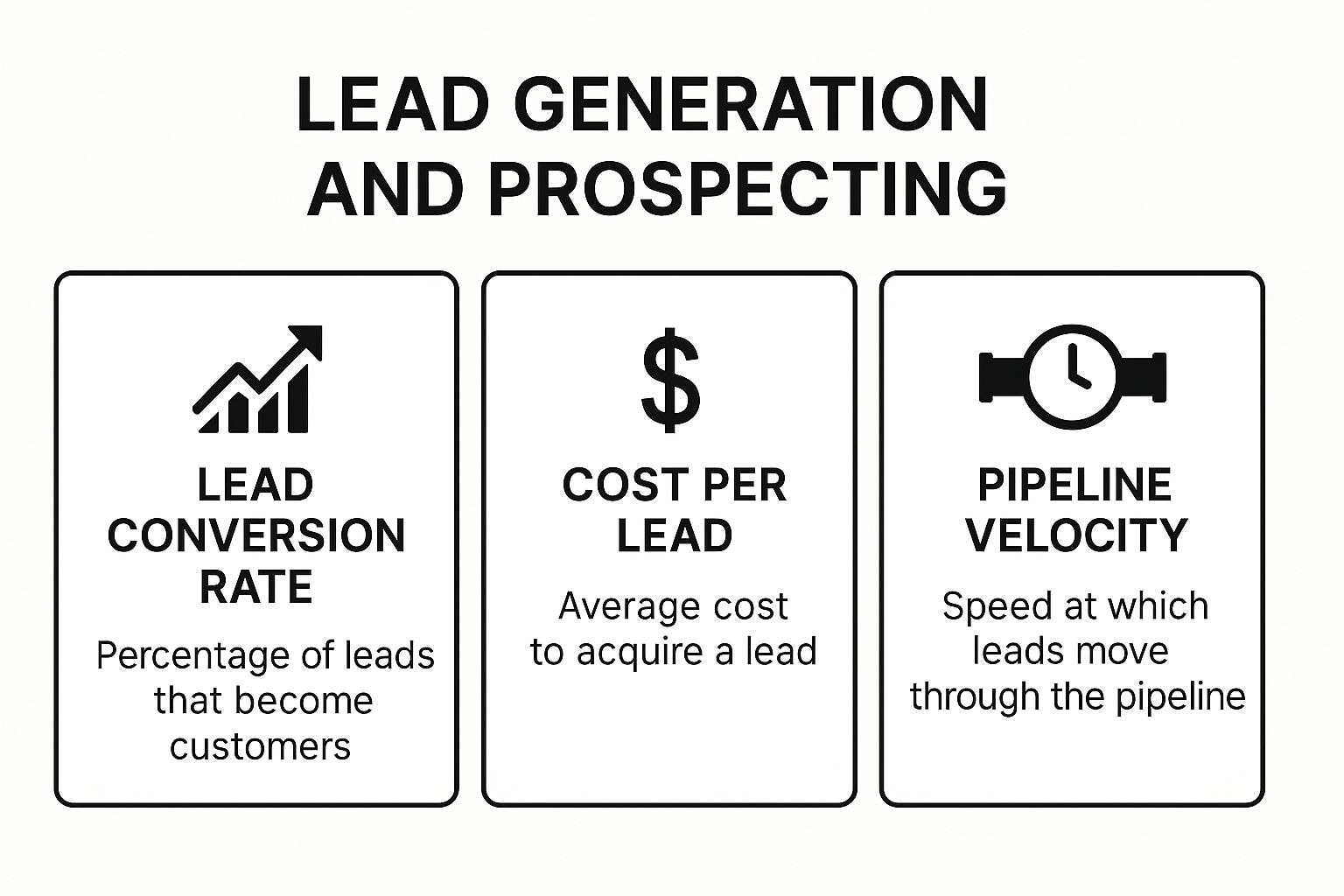In the competitive marketplace of 2025, the role of a sales agent has evolved far beyond simple transactions. Today's top performers are strategic advisors, market analysts, and relationship architects, all rolled into one. Understanding the core duties and responsibilities of a sales agent is the first step towards not just meeting targets, but consistently exceeding them. This guide provides a definitive breakdown of the fundamental pillars that define the modern sales role, offering actionable insights and a clear roadmap for achieving excellence.
We will explore the multifaceted skills that distinguish a truly effective sales professional, moving beyond theory to offer practical applications. From mastering the art of prospecting and building lasting customer relationships to leveraging data for precise forecasting, each section is organised to deliver clarity and depth.
Whether you're a contact centre supervisor aiming to elevate your team's performance or an IT manager seeking to understand the operational demands of a sales force, this comprehensive overview provides the blueprint you need. This article is your essential resource for mastering the responsibilities that drive sales success and foster sustainable business growth in any sector.
1. Lead Generation and Prospecting
The foundational duty of any effective sales agent is mastering lead generation and prospecting. This is the proactive process of identifying, researching, and qualifying potential customers for your company's products or services. It is more than just cold calling; it involves building a sustainable pipeline of prospects who can be strategically nurtured and converted into loyal customers. This core responsibility ensures a continuous flow of opportunities, making it a non-negotiable skill for sales success.
How It Works in Practice
Modern prospecting integrates technology and relationship-building principles. For instance, a B2B sales agent might leverage LinkedIn Sales Navigator to identify decision-makers in target industries, while a B2C agent could use inbound marketing techniques popularised by HubSpot to attract qualified leads through valuable content. The goal is to move beyond a scattergun approach and focus on high-potential individuals or organisations.
A key part of this responsibility involves diligent research to personalise outreach. Before making contact, an agent should understand the prospect's business challenges, recent company news, and professional background. For sales agents, mastering the art of lead generation is crucial, and exploring proven lead generation tactics can offer valuable insights applicable across industries.
Actionable Strategies for Success
To excel in this area, agents must adopt a structured and consistent approach.
- Set Daily Goals: Establish clear, measurable daily targets for prospecting activities, such as the number of new contacts researched or outreach messages sent.
- Personalise Outreach: Avoid generic templates. Reference a prospect's recent article, a company milestone, or a shared connection to build immediate rapport.
- Leverage Referrals: Actively ask satisfied customers for introductions. A warm referral is significantly more effective than a cold approach.
- Track Metrics: Consistently monitor key performance indicators to understand what works.
The following infographic highlights three critical metrics to track for effective lead generation and prospecting.

Tracking these metrics provides a clear, data-driven view of your prospecting efficiency, helping you refine your strategy and focus your efforts where they will yield the best results. For those looking to enhance their strategy, understanding the nuances of different contact methods is key. To explore this further, you can find a deeper dive into outbound calling strategies at Cloud Call Center AE.
2. Customer Relationship Management
Beyond securing the initial sale, a critical responsibility for any sales agent is mastering customer relationship management (CRM). This is the ongoing process of building, maintaining, and strengthening connections with both potential and existing customers throughout their entire lifecycle. It involves deeply understanding their needs, providing personalised service, and ensuring long-term satisfaction to drive repeat business and referrals. This duty transforms a one-time transaction into a sustainable, long-term partnership, which is vital for business growth.

How It Works in Practice
Modern CRM is heavily reliant on technology to organise and scale relationship-building efforts. A B2B agent might use a CRM system like Salesforce to track every interaction, from initial emails to post-sale support calls, ensuring no client detail is forgotten. Similarly, Zappos built its brand on a customer-centric service culture, empowering its agents to go above and beyond to foster loyalty. The core principle, popularized by figures like Marc Benioff, is to create a unified view of the customer to deliver consistent and personalised experiences at every touchpoint.
This responsibility requires a proactive, not reactive, mindset. Instead of waiting for a customer to report an issue, an effective agent schedules regular check-ins to ensure the product or service is meeting expectations. To excel in nurturing these connections, agents can benefit from understanding essential client relationship management tips that focus on proactive communication and value delivery.
Actionable Strategies for Success
To effectively manage customer relationships, agents must adopt systematic and empathetic practices.
- Maintain Detailed Profiles: Use a CRM to diligently record customer preferences, interaction history, and important personal details to personalise future communications.
- Schedule Regular Check-ins: Establish a calendar for contacting key accounts to discuss their progress, offer support, and maintain a strong presence.
- Respond Promptly: Prioritise quick and helpful responses to all customer inquiries and concerns to demonstrate reliability and build trust.
- Utilise Automation Thoughtfully: Employ automation tools for consistent follow-ups and updates, but always leave room for genuine, personal interaction.
Ultimately, a robust CRM strategy is foundational to retention and growth. For organisations looking to centralise these efforts, choosing the right platform is key. You can find out more about selecting the best CRM for call center operations to support your sales team.
3. Product Knowledge and Expertise
A core duty of a sales agent is to develop and maintain a comprehensive understanding of the products or services they represent. This goes far beyond memorising features; it involves a deep knowledge of benefits, technical specifications, competitive advantages, and practical applications. This expertise is what transforms a salesperson from a mere presenter into a trusted advisor, capable of articulating value, overcoming objections, and tailoring solutions to a client's specific pain points. Without it, building credibility and closing complex deals is nearly impossible.
How It Works in Practice
Demonstrating deep product knowledge builds a foundation of trust with potential customers. For instance, IBM's technical sales specialists are renowned for their profound understanding of complex enterprise solutions, allowing them to guide clients through intricate implementation scenarios. Similarly, a Tesla product specialist must be able to explain everything from battery technology and charging infrastructure to software updates, addressing sophisticated questions from knowledgeable buyers. This level of expertise ensures the agent can confidently position their offering as the superior solution.
This responsibility also involves understanding the competitive landscape. A proficient sales agent knows not only their product's strengths but also its weaknesses relative to competitors. This allows them to proactively address potential concerns and frame their solution's unique value proposition effectively. This strategic positioning is a key element in methodologies popularised by thought leaders like Geoffrey Moore, who emphasised understanding the technology adoption lifecycle.
Actionable Strategies for Success
To cultivate and maintain expert-level product knowledge, agents should integrate continuous learning into their routine.
- Attend Regular Training: Actively participate in all official product training sessions, webinars, and certification programmes offered by the company.
- Use the Product Personally: Where possible, use the product or service yourself. First-hand experience provides invaluable insights and authentic talking points.
- Create Use-Case Studies: Develop and study real-world examples of how customers have successfully implemented the product to solve specific problems.
- Stay Updated on Roadmaps: Keep informed about upcoming features, product updates, and the company's long-term vision to discuss future value with clients.
4. Sales Presentations and Demonstrations
A pivotal duty for any sales agent is the delivery of compelling sales presentations and demonstrations. This is where a prospect’s initial interest is transformed into a tangible understanding of value. It involves more than just listing features; it’s the art of storytelling, where the product or service is positioned as the definitive solution to the prospect’s specific challenges. A masterful presentation builds confidence, addresses concerns, and guides the potential customer toward a purchasing decision, making it a critical responsibility in the sales cycle.

How It Works in Practice
Modern sales presentations are highly personalised and interactive. Instead of a one-size-fits-all script, an effective agent tailors the narrative to the prospect's industry, role, and identified pain points. For example, a software agent demonstrating a CRM to a small business will focus on ease of use and affordability, whereas a presentation to an enterprise client would highlight scalability, security, and integration capabilities.
The goal is to create an engaging experience. This can be seen in the iconic product launches popularised by Steve Jobs, which focused on a clean narrative and powerful visuals, or Salesforce's dynamic Dreamforce demonstrations. This core part of the duties and responsibilities of sales agent requires a blend of showmanship, technical knowledge, and deep empathy for the customer’s needs.
Actionable Strategies for Success
To excel in delivering presentations, agents should focus on preparation, structure, and continuous improvement.
- Start with Pain Points: Begin the presentation by acknowledging the prospect's challenges. This immediately establishes relevance and shows you have done your research.
- Use the 'Tell, Show, Do' Method: First, tell them what you are going to show them. Then, show them the solution in action. Finally, allow them to do it themselves through an interactive Q&A or a trial.
- Prepare a Backup Plan: Technical issues can derail a demonstration. Always have offline slides, screenshots, or a pre-recorded video ready as a contingency.
- Practise and Gather Feedback: Regularly rehearse presentations with colleagues and solicit honest feedback to refine your delivery, timing, and clarity.
The following video from sales expert Victor Antonio offers powerful techniques for structuring a presentation that grabs and holds a prospect's attention.
By mastering the art of the presentation, a sales agent can effectively communicate value and significantly shorten the sales cycle. This skill is indispensable for building trust and closing deals in any competitive market.
5. Negotiation and Closing Deals
A pivotal responsibility for any sales agent is successfully navigating the final stages of the sales process through skilled negotiation and closing. This is the strategic culmination of all prior efforts, where agents handle objections, discuss terms, and guide the prospect toward a final commitment. It requires a delicate balance of assertiveness and empathy, ensuring the deal is profitable for the company while delivering genuine value to the client. This duty is where potential revenue becomes actual revenue, marking the ultimate measure of a sales cycle’s success.
How It Works in Practice
Effective negotiation moves beyond a simple price discussion; it is about communicating value and building a partnership. For example, an enterprise software agent at a company like Oracle doesn’t just sell features; they negotiate a comprehensive solution that addresses a client's long-term operational challenges, often involving multi-year contracts and customised service levels. Similarly, a real estate agent manoeuvres through offers and counter-offers, managing the emotional and financial stakes for both buyer and seller to reach a mutually agreeable contract. The goal is to create a win-win scenario, not a zero-sum game.
This responsibility is heavily influenced by principles from experts like Chris Voss, who champions tactical empathy to understand and influence the other party’s perspective. Successfully converting prospects into customers hinges on the ability to negotiate effectively; delve deeper into how to master sales negotiation skills to seal lucrative deals. This approach transforms a transactional conversation into a collaborative problem-solving session, solidifying the agent’s role as a trusted advisor.
Actionable Strategies for Success
To excel at closing, agents must be prepared, perceptive, and strategic in their approach.
- Understand Decision Dynamics: Identify all key stakeholders and understand their individual motivations and the company's official decision-making process before entering negotiations.
- Negotiate Value Before Price: Anchor the conversation on the return on investment and the long-term benefits of your solution, making price a secondary consideration.
- Prepare Multiple Scenarios: Have best-case, target, and walk-away scenarios planned out. This preparation allows for flexibility and prevents you from accepting unfavourable terms.
- Use Silence Strategically: After presenting a proposal or a key point, pause. Allowing the prospect to speak first can reveal crucial information about their position and priorities.
6. Market Research and Analysis
A crucial, yet often underestimated, duty of a sales agent is conducting thorough market research and analysis. This involves systematically gathering, analysing, and interpreting data about the market, competitors, and customer behaviour. More than just a preparatory step, ongoing market analysis allows an agent to stay ahead of industry trends, identify untapped opportunities, and tailor their sales approach with precision. This responsibility ensures that sales strategies are not based on assumptions but on solid, data-driven insights, making it a key differentiator for top performers.
How It Works in Practice
Modern market analysis integrates various data sources to build a comprehensive picture. For example, a sales agent in the technology sector might use reports from Gartner to understand industry-wide shifts, while an agent in fast-moving consumer goods could analyse Nielsen data to grasp consumer purchasing habits. This responsibility requires an agent to be an informed consultant, not just a seller.
The practical application involves using this intelligence to refine sales pitches and identify new customer segments. By understanding the competitive landscape through frameworks popularised by strategists like Michael Porter, an agent can better position their product’s unique value proposition. This proactive approach transforms a sales agent's role from reactive order-taking to strategic business development, which is a vital part of the duties and responsibilities of sales agent in today's competitive environment.
Actionable Strategies for Success
To excel in market research, agents must integrate it into their regular workflow.
- Use Diverse Data Sources: Combine quantitative data (market reports, analytics) with qualitative insights (customer feedback, social media trends) for a holistic view.
- Set Up Automated Alerts: Use tools like Google Alerts to receive real-time updates on competitors, key clients, and industry news.
- Develop Customer Personas: Create detailed profiles of your ideal customers based on research findings to personalise outreach and messaging.
- Collaborate with Other Teams: Regularly share market insights with marketing and product development teams to foster a unified, customer-centric company strategy.
7. Sales Planning and Territory Management
A crucial, yet often overlooked, duty for a sales agent is strategic sales planning and territory management. This responsibility involves the methodical organisation and optimisation of sales activities across specific geographic areas or customer segments. More than simply reacting to inbound leads, it requires a proactive approach to setting goals, allocating resources, and prioritising opportunities to ensure maximum efficiency and revenue generation within an assigned territory. Effective territory management transforms a list of accounts into a structured business plan, making it an indispensable discipline for sustainable sales success.
How It Works in Practice
Modern sales planning leverages data to create a blueprint for success. For instance, a pharmaceutical sales agent might use CRM data to map out a systematic coverage model, ensuring every high-potential clinic is visited on an optimal schedule. Similarly, a software sales agent might implement a named account strategy, focusing intense effort on a handful of high-value enterprises rather than spreading their attention too thinly. This strategic approach ensures that time and resources are invested where they will yield the greatest return.
This duty requires an analytical mindset to segment the territory based on potential, existing relationships, and logistical efficiency. The agent must create a rhythm for account engagement, balancing new business development with existing account management. This structured approach, popularised by methodologies from sales strategists like Miller Heiman, is a core part of the duties and responsibilities of a sales agent in a well-organised sales force.
Actionable Strategies for Success
To excel at territory management, an agent must treat their territory like a personal business franchise.
- Set SMART Goals: Establish Specific, Measurable, Achievable, Relevant, and Time-bound objectives for your territory, such as increasing market share by 10% in six months.
- Segment and Prioritise: Use data analytics to categorise accounts into tiers (e.g., A, B, C) based on their potential and prioritise your time and efforts accordingly.
- Create a Coverage Plan: Develop a systematic schedule for contacting all accounts in your territory, ensuring no opportunity is neglected. This could be a 30-60-90 day contact cycle.
- Regularly Review and Adjust: Dedicate time each month or quarter to review performance against your plan, analyse what is working, and make necessary adjustments to your strategy.
8. Sales Reporting and Performance Tracking
Beyond closing deals, a crucial duty for a sales agent is the systematic tracking and reporting of sales performance. This responsibility involves the meticulous collection, analysis, and communication of key sales metrics, activities, and outcomes. It provides a clear, data-driven picture of what is working and what is not, enabling both the agent and management to make informed decisions. This accountability ensures that sales efforts are aligned with broader business objectives and facilitates continuous improvement.
How It Works in Practice
Modern sales reporting is powered by CRM platforms like Salesforce or HubSpot, which automate much of the data collection process. An agent's responsibility is to maintain the integrity of this data by consistently logging activities, updating deal stages, and recording customer interactions. For example, after a product demonstration, an agent would immediately update the CRM with notes, change the opportunity stage, and adjust the forecast.
This diligent record-keeping transforms raw data into actionable insights. Management can then use these reports to identify trends, forecast revenue, and evaluate individual and team performance against targets. The practice, popularised by figures like Marc Benioff who championed a data-driven sales culture, is fundamental to building a scalable and predictable sales engine.
Actionable Strategies for Success
To master this essential duty, agents must integrate reporting into their daily workflow.
- Update CRM in Real-Time: Log calls, emails, and meeting notes immediately after they occur to ensure data accuracy and prevent information gaps.
- Focus on Leading Indicators: Track activities that precede sales, such as calls made or meetings booked, not just lagging indicators like closed deals, to proactively manage your pipeline.
- Automate Where Possible: Utilise the automated reporting features within your CRM to generate daily or weekly dashboards, saving time and reducing manual effort.
- Review Reports Regularly: Schedule time to review your performance metrics with your manager to gain feedback, identify areas for improvement, and refine your strategy.
Effective reporting relies on well-designed dashboards that present critical data clearly. To understand how these tools are structured, you can gain valuable insights by exploring examples of a call centre reporting dashboard.
Duties & Responsibilities Comparison of 8 Sales Agent Roles
| Aspect | Lead Generation and Prospecting | Customer Relationship Management | Product Knowledge and Expertise | Sales Presentations and Demonstrations | Negotiation and Closing Deals | Market Research and Analysis | Sales Planning and Territory Management | Sales Reporting and Performance Tracking |
|---|---|---|---|---|---|---|---|---|
| Implementation Complexity 🔄 | Moderate to High – multi-channel and CRM integration | High – requires consistent service and CRM systems | Moderate – ongoing training and certification | Moderate to High – prep, storytelling, and tech setup | High – strategic prep and stakeholder handling | Moderate to High – requires specialized skills | High – strategic planning and ongoing adjustments | Moderate – discipline and system setup required |
| Resource Requirements ⚡ | Tools for outreach, CRM, data analysis | CRM software, training, automation | Training programs, certifications, product access | Presentation tools, multimedia, and practice time | Skilled negotiators, training, and scenario prep | Analytical tools, data sources, reports | Analytics tools, mapping software, time investment | CRM systems, reporting tools, data entry effort |
| Expected Outcomes 📊 | Consistent lead flow, predictable revenue forecast | Increased customer lifetime value and referrals | Higher credibility, consultative sales success | Engaged prospects, effective objection handling | Profitable deals, stronger relationships | Data-driven decisions, market opportunities | Maximized territory revenue and efficiency | Transparent performance, accurate forecasting |
| Ideal Use Cases 💡 | Building sales pipeline, identifying prospects | Managing and growing customer relationships | Complex products needing expert explanation | Engaging diverse prospects, product launches | Closing deals, pricing and contract negotiations | Informing strategy, tracking market trends | Organizing sales coverage and account focus | Tracking performance, continuous sales improvement |
| Key Advantages ⭐ | Pipeline consistency, market intelligence | Customer loyalty, reduced acquisition costs | Trust-building, improved closing rates | Memorable presentations, live feedback | Revenue impact, negotiation leverage | Competitive insight, precise targeting | Strategic resource use, clear goal setting | Accountability, actionable insights |
Integrating Responsibilities for Peak Performance
The journey through the core duties and responsibilities of a sales agent reveals a clear truth: success is not achieved by mastering a single task, but by orchestrating a symphony of interconnected skills. The role is far more than a series of disconnected actions like prospecting, presenting, and closing. Instead, it is a dynamic ecosystem where each responsibility fuels the next, creating a powerful cycle of growth and achievement.
Consider how these elements weave together. Meticulous market research and analysis (Duty #6) directly inform effective lead generation and prospecting strategies (Duty #1). Deep product knowledge (Duty #3) becomes the foundation for compelling sales presentations and demonstrations (Duty #4), which in turn, builds the trust necessary for successful negotiation and closing (Duty #5). This entire process is underpinned by diligent sales reporting (Duty #8) and strategic territory management (Duty #7), with every single interaction meticulously documented and nurtured within a robust Customer Relationship Management system (Duty #2).
The Power of a Holistic Approach
Viewing these duties in isolation is the most common pitfall for aspiring sales professionals. A truly exceptional agent understands that their performance is a direct result of how well they integrate these functions. They don't just manage a territory; they analyse it to find untapped opportunities. They don't just log calls in a CRM; they use the data to personalise follow-ups and anticipate customer needs.
By embracing an integrated mindset, a sales agent transforms from a mere functionary into a strategic business driver. They become a trusted advisor to their clients and an invaluable asset to their organisation, capable of not just meeting targets but consistently exceeding them.
Actionable Next Steps to Elevate Your Performance
To translate this understanding into tangible results, focus on creating seamless connections between your daily tasks. Here are your next steps:
- Audit Your Workflow: Identify where the handoff between your responsibilities is weakest. Is your market research failing to generate quality leads? Are your CRM notes detailed enough to enhance your next sales presentation? Pinpoint these gaps and focus on strengthening the links.
- Leverage Technology: Modern sales tools are designed to break down silos. Implement and master a CRM that integrates with your communication platforms. Use analytics tools to connect your sales activities directly to performance outcomes, making your reporting more insightful.
- Practise Cross-functional Thinking: Before every sales call, ask yourself: How does my market analysis apply here? What long-term relationship goals does this interaction serve? This habit ensures every action is strategic and purposeful.
Ultimately, mastering the duties and responsibilities of a sales agent is an ongoing journey of refinement and integration. By moving beyond a simple checklist and adopting a holistic, strategic perspective, you position yourself not just for success, but for sustained excellence in the competitive world of sales. This integrated approach is the definitive hallmark of a top-performing sales professional.
Ready to empower your sales team with the tools they need to integrate their responsibilities seamlessly? Explore how Cloud Move's unified communications and contact centre solutions can centralise your customer interactions, automate reporting, and provide the insights needed for peak performance. Visit Cloud Move to learn how you can transform your sales operations today.




